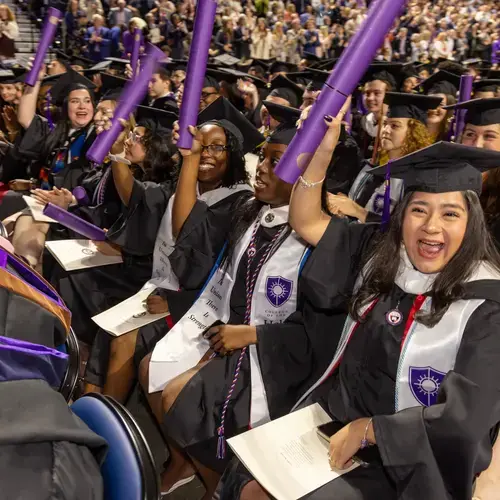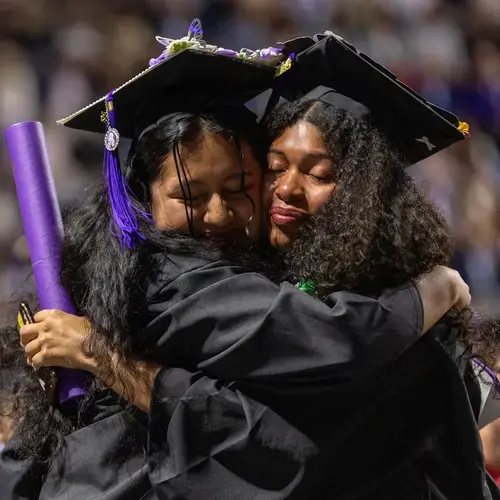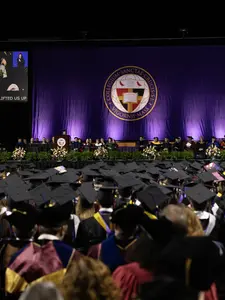
Information For Guests With Accessibility Needs
If you have a need that is not addressed below, please complete the accessibility request form by Friday, May 1 so the Commencement staff can be in touch to assist you.


The College of the Holy Cross will celebrate its 180th Commencement Exercises for the Class of 2026 on Friday, May 22, 2026. Please see a complete listing of Commencement events below. We hope families are able to join.


Mosaic Graduate Celebration
5-7 p.m., The Prior Performing Arts Center, Beehive
This event honors and celebrates the achievements of students from a wide range of identities in the Class of 2026 who have made a meaningful impact on the College community. Hosted by the Division of Justice, Equity, Belonging, and Identity (JEBI).

Phi Beta Kappa Induction Ceremony
10 a.m., Smith Hall, Rehm Library
Phi Beta Kappa National Honor Society will hold the 2026 induction ceremony to welcome new members to Phi of Massachusetts, the Holy Cross chapter. A number of students will be inducted into this prestigious honor society. Family, friends, faculty and students are welcome.

NROTC Commissioning
11:00 a.m., St. Joseph Memorial Chapel
This traditional ceremony awards commissions in the United States Navy and Marine Corps to students graduating through the NROTC program at the College of the Holy Cross. The NROTC program includes crosstown enrollment students from Worcester Polytechnic Institute, Worcester State University, and Brown University.

Awards Ceremony
12:30 p.m., Dinand Library, Main Reading Room
Senior Academic Awards and Prizes will be presented by Francisco Gago-Jover, dean for the Class of 2026, and the Presidential Service Awards will be presented by President Vincent D. Rougeau assisted by Michele C. Murray, Senior Vice President for Student Development and Mission. This event will be available via livestream.
Baccalaureate Mass
3 p.m., Fitton Football Stadium
This annual liturgy of celebration, blessing, and thanksgiving is open to all seniors, their families and guests. All faith traditions and beliefs are most welcome and there is no limit to the number of guests who may attend. Members of our Jesuit community will preside and preach, while students, faculty and staff of the College will serve as our ministers and musicians. This event will be available via livestream.
Fitton Football Stadium is an outdoor venue. As guests are planning, please note that the weather at the end of May is often quite warm, and that getting onto the field requires navigating grass and uneven ground. For elderly guests and those with limited mobility, accessibility information can be found in the accessibility section, including transportation and access to the football stadium. In the event of inclement weather, Baccalaureate Mass will be moved indoors.

Last Sunset on The Hill
7:30 - 9:30 p.m., Hogan Campus Center, Hoval
Members of the Class of 2026 and their families are invited to gather and enjoy one final sunset on The Hill. The event will include live music, light food and refreshments. There is no cost to attend this event.
180th Commencement Exercises
10:00 a.m., DCU Center
The College will celebrate the 180th Commencement Exercises for the Class of 2026 with graduates and guests. Please join President Vincent D. Rougeau in honoring the achievements of our graduates. There is no limit to the number of guests who may attend Commencement, however, all guests will be required to have a ticket for entry into the DCU Center. See additional details in the Ticketing section below.
Doors will open at 8 a.m. and seating is on a first come, first served basis. The procession of graduates will begin promptly at 10:00 a.m. The ceremony is expected to conclude around 1 p.m. This event will also be available via livestream.
Commencement Reception
Immediately following the ceremony, DCU Center Convention Hall
Graduates and their guests will have the opportunity to celebrate with faculty and staff. A light fare menu will be served.
We advise guests to book hotels early. A listing of College partner hotels can be found here.
A limited number of on-campus rooms will be available for family housing on Thursday, May 21. Rooms will be available on a first come, first served basis. Each room has two twin-size beds. Please note, rooms do have air conditioning and private bathrooms. Cost is $50/room. Reservations will open in the spring semester.
There is no limit to the number of guests who may attend Commencement. However, all guests will be required to have a ticket for entry into the DCU Center. Tickets are free and will be delivered digitally. Graduates will receive a link to claim their tickets via the Tassel system and then be expected to electronically distribute them to their guests. Graduates will be emailed additional details and instructions in the spring semester.
Tickets only allow entry into the DCU Center. Once inside, there are no assigned seats for the ceremony. All seats are on a first come, first served basis.
Please note: Due to the ticketing software, ticket registration is limited to eight guests at a time. If graduates plan to have more than eight guests in attendance, they can submit this information when they register for Commencement in the Tassel system.
Class Photo
Prints and framed copies of the Class of 2026 photo taken during orientation can be purchased at panfoto.com.
The College works with Herff Jones for the ordering of class rings. Class rings can be ordered online. Periodically, Herff Jones is on campus outside of the College Store in the Hogan Campus Center. For more information, please contact hcstore@holycross.edu.
The College will create and distribute a press release to the hometown news outlets, high schools, and local elected officials of every 2026 graduate. See the Merit Pages FAQ for more detailed information.
Please note: Dinner will not be available on campus Thursday evening; however, there are a few reception options with light fare. Worcester has many wonderful restaurants. Visit Discover Central Mass for a listing of local options. Reservations are strongly encouraged.
During the Commencement ceremony, GradImages will be photographing graduates. Each graduate will have their photo taken with the president as they cross the stage, and also once they exit the stage. Proofs of these will be available after the ceremony. You will be able to purchase prints and/or digital copies of the images.
Graduating seniors will need to completely move out of the residence halls by 8:00 p.m. on Friday, May 22, 2026. Residence Life and Housing recommends that students begin to pack up their spaces before graduation to make the move-out process smoother.
The Class of 2026 yearbook is available for purchase online. Feb. 28 is the last day personalization will be offered. Parents of the Class of 2026 can purchase a parent ad in the yearbook and share a special message using this online form. Learn more about parent ads.
The Purple Patcher Yearbook Club works in collaboration with the Office of Student Involvement to coordinate senior photos for the yearbook and yearbook sales. Please contact patcher@g.holycross.edu or osi@holycross.edu with questions.
ASL interpreters will be present on the stage throughout the Mosaic Celebration, Phi Beta Kappa Induction Ceremony, NROTC Commissioning, Awards Ceremony, Baccalaureate Mass, and Commencement. At Baccalaureate Mass, seats are reserved on the stage left (audience right) side for viewing the interpreter and a large screen with a picture-in-picture display will be available. For the Commencement Ceremony at DCU, there will be large video display boards on both sides of the stage, as well as the overhead jumbotron, with a picture-in-picture display.

If you or a member of your party anticipate using these services, please complete the accessibility request form so we can best assist you.
Assistive listening devices are available on a first come, first served basis during the Awards, Baccalaureate Mass, and Commencement.
Live captioning will be available on the livestream of the Awards, Baccalaureate Mass, and Commencement ceremony. These links will be made available in May.
At Baccalaureate Mass and Commencement, live captions will be available on large video display boards with a picture-in-picture of the interpreter. These displays will show open captions in real time, provided by a human captioner. These same captions will be available for those watching the livestream on YouTube.
Deaf Services Unlimited also provides a stream of the captions (not video) to a website called StreamText for viewing on any mobile device if desired. StreamText is a browser based platform for viewing live, text only captions. Links to the StreamText captions will be made available closer to the event.
Shuttles will be operating on continual loops throughout campus on Thursday, May 21 to assist guests. Stops include: Luth Athletic Complex, Hogan 3, upper-deck of the Parking Garage, Freshmen Field, and Fitton Football Field. These stops will be marked with signage. A medical transport van that is wheelchair accessible is part of the rotation.
Additional handicap parking spaces will be added to the Hogan Campus Center Parking Lot (first row) and the nearby “Shared Van” lot next to Ciampi-Condron is also being designated for handicap parking. Additionally, the bottom level of the Parking Garage will be reserved for guests with handicap placards.
For Baccalaureate Mass, guests who use wheelchairs or have limited mobility, and who are not utilizing our shuttles, should be dropped off at Gate Zero. Then drivers can move the vehicle to the parking garage or other available spaces. All seating for this event is on the football field directly. There are no specific “handicap seats” as the chairs are folding and moveable as needed. Guests with mobility challenges are advised to be dropped off at Gate Zero (as noted on the accessibility map). There will be staff and golf carts available there to assist guests in getting to seats. Otherwise the main stadium entrance has a few stairs that can be difficult to navigate.
Staff will be available to assist guests in finding seats that work best for the family. There are also restrooms available on the field level behind the bleachers.
At the DCU Center, is handicapped accessible. Handicap permit parking in designated and metered spots is available adjacent to the DCU Center. The Mercantile Garage is the nearest garage to the DCU Center event entrance. More information can be found on the DCU Center website.
Once in the DCU Center, there are handicap seating sections on the same level that require no stairs, and seats below and above that would require some stairs. The handicap seating sections are first come, first served. Folks can have a companion sit with them in these sections. There are seats directly in front of these sections, so that would be a good spot for the rest of the party to sit near one another. As seats are first come, first served, we advise members of the party arriving early to secure your preferred seats.
In addition to traditional print programs, programs will be made available via PDF files for viewing on electronic devices to enhance size or utilize reading devices. The electronic versions will be available as PDF downloads from the Commencement website.
Translation services in several languages (including but not limited to Spanish, French, Chinese) will be available via a mobile app for the Baccalaureate Mass and Commencement Ceremony. More details will be shared in the spring semester.
There is no limit to the number of guests who may attend Commencement. However, all guests (graduates do not need tickets) will be required to have a ticket for entry into the DCU Center. Tickets are free and will be delivered digitally. Graduates will receive a link to claim their tickets via the Tassel system and then be able to electronically distribute them to their guests. Tickets will be available to claim in the spring semester.
Please note: due to the ticketing software, ticket registration is limited to 8 guests at a time. If graduates plan to have more than 8 guests in attendance, they can submit this information when they register for Commencement in the Tassel system. All additional requests for tickets will be granted.
Children 4 years of age and older need a ticket to enter the DCU Center for Commencement.
The College is introducing ticketing to aid in event preparation and better ensure those in attendance are invited guests of graduates.
No. Tickets can be scanned electronically. If guests prefer, they can print their tickets.
Graduates claim their tickets for their guests through the Tassel system. E-tickets are then automatically emailed to graduates. Graduates will be responsible for distributing their tickets to guests as needed.
Graduates can make changes to their tickets by logging into the Tassel system.
Guests on Thursday may park in the following locations: Hogan lots, Freshmen Field (weather permitting), and the parking garage. Shuttles will be available to assist with transportation on campus from lots to event locations.
The College is able to provide some transportation assistance for on-campus events via shuttles, but we are not able to supply wheelchairs. For those in need of wheelchairs during events on Thursday or Friday we recommend you bring your own, or consider renting one. Apple Homecare and Rehab in Sterling, MA can be contacted for rentals.
No, this event is free for students and families.
Yes, the College has hired a photographer to take photos throughout the ceremony. Ceremony pictures will be posted to the College website following Commencement. Additionally, photos will be taken of graduates with the president as they walk across the stage and after exiting the stage. These will be available for review and purchase from GradImages. Students will receive additional information about this.
Electronic diplomas will be released to graduates the day of Commencement. The physical paper diplomas are mailed to their home addresses (as listed in STAR) approximately four weeks after Commencement.
Please contact the Purple Patcher Yearbook at patcher@g.holycross.edu or osi@holycross.edu with questions.
Senior Week, sponsored by the Student Government Association Senior Class Council, will begin on Sunday, May 17. More information regarding other student celebrations will be sent to seniors from your Student Government Association Senior Class Council when it is available. Please contact the Office of Student Involvement at osi@holycross.edu with questions.
The College works with Herff Jones for the ordering of class rings. Class rings can be ordered online. Periodically, Herff Jones is on campus outside of the College Store in the Hogan Campus Center. For more information, please contact hcstore@holycross.edu.